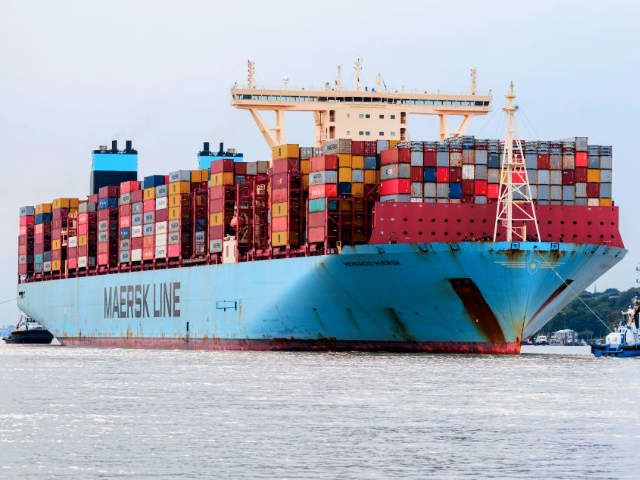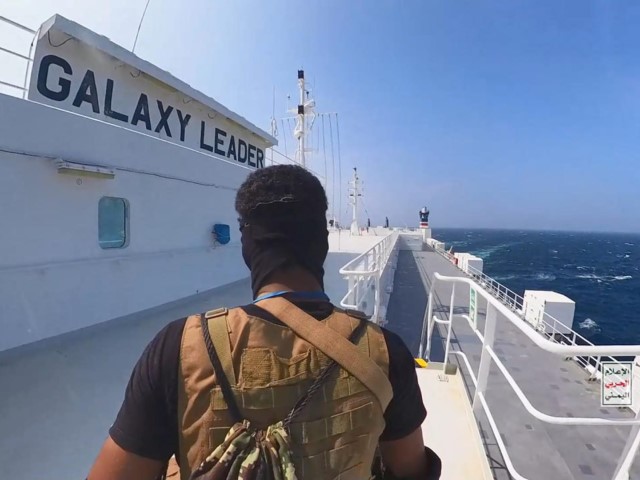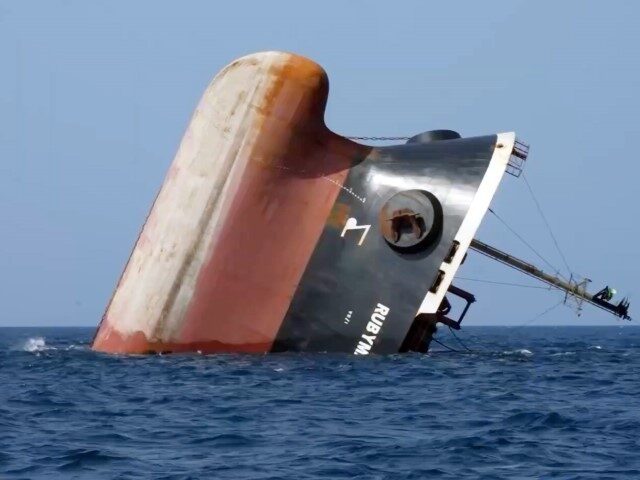Danish shipping giant A.P. Moller-Maersk announced on Tuesday that it will continue to avoid Red Sea shipping lanes for the “foreseeable future” due to terrorist attacks by the Iran-sponsored Houthi insurgents of Yemen.
Maersk explained to its customers that the Red Sea crisis is more “complicated” than ever, risks to the safety of ships and crews remain intolerable, and the risk zone is actually expanding further offshore despite U.S. President Joe Biden’s promises to protect ships against Houthi drones and missiles.
Maersk said both costs and prices for shipping have increased considerably due to the Houthi attacks, which are also making deliveries slower because ships must detour far around the convenient Red Sea-Gulf of Aden-Suez Canal corridor. Struggling to keep up with demand after effectively losing 15 to 20 percent of its Far Eastern capacity has left Maersk short of ships, containers, and crew.

The container ship “Monaco Mærsk” of the world’s largest shipping company “Mærsk Line” sails on the Elbe towards Hamburg, August 2, 2022. (Markus Scholz/picture alliance via Getty)
The company regretfully informed customers that a 40-percent increase in fuel costs had to be passed along to them. The company tried to compensate by eliminating its peak season surcharge, but was forced to reinstate the charge in order to continue operating at a profit.
A tracking service called Container xChange reported on Monday that Maersk has leased an additional 125,000 shipping containers to make up for the longer sea voyages, but unfortunately many of those containers have become “stranded” in the complicated new shipping network that avoids the Red Sea.
“Container prices are continuously climbing, adjusting every 48 hours,” Container xChange said.
German shipping company Hapag-Lloyd also said on Monday that it will continue to avoid the “risk zone” because of the out-of-control Houthi attacks.
“What we are seeing is that the attacks in the Red Sea and the Gulf of Aden are moving further and further out to sea. That is why we are avoiding this area altogether,” the company told Reuters.
Abdul Malik al-Houthi, leader of the Iran-armed insurgents, has repeatedly vowed to expand attacks and target ships in formerly safe areas.
“The American and British attacks have not affected our military power in any way. On the contrary, the process of increasing and expanding our attacks continues. The Americans are now admitting their failure to achieve their aggressive goals against our country and are surprised by our strength,” the Houthi leader said in March.

A Yemeni protestor lifts his dagger with a picture of Houthi leader Abdul Malik Al-Houthi as he takes part in a rally to support the Palestinian people against Israel over the sustained war in the Gaza Strip, on February 23, 2024, in Sana’a, Yemen. (Mohammed Hamoud/Getty)
On Friday, the Houthis said they would target any ship heading for Israel, including ships coming from the Mediterranean Sea. Houthi spokesman Brig. Gen. Yahya Saree described the increased range and tempo of operations as the “fourth phase” of the Houthi terrorism plan.
Saree said:
If the Israeli enemy intends to launch an aggressive military operation against Rafah, the Yemeni Armed forces will impose comprehensive sanctions on all ships and companies that are related to supplying and entering the occupied Palestinian ports of any nationality and will prevent all ships of these companies from passing through the armed forces’ operation zone regardless of their destination.
“The Houthis continue to endanger commercial shipping that goes through that region, continue to put at risk U.S. forces, other countries’ forces in the region who want to see commerce continue to flow in a very crucial area in the Middle East,” a Department of Defense spokesperson said Monday, per the USNI News.
Writing at the Wall Street Journal on Monday, Walter Russell Mead worried that the Houthis are making Biden look impotent, causing the Middle Eastern war to inexorably expand. Biden is also losing the public relations war, as public opinion in countries like Indonesia and Malaysia turns against a weakened United States, making the Houthis into regional folk heroes.
Mead warned that Biden is on the cusp of losing the entire region to China, which now has good reason to doubt the United States can protect allies like Taiwan and the Philippines against its territorial aggression:
Malaysia is a major regional player with a rapidly developing economy. Resource-rich Indonesia remains critical to the regional balance of power and to the Association of Southeast Asian Nations [ASEAN], a critical arena for great-power diplomacy across Southeast Asia. Sensing an opportunity, China is moving with alacrity to differentiate its Middle East position from America’s. It recently hosted “reconciliation” talks between Hamas and Fatah representatives, following talks in Moscow. Expect more focused signaling, disinformation campaigns and diplomatic maneuvers as China and Russia work to drive wedges between ASEAN and the West.
[…]
Washington’s unwillingness or inability to stop Houthi piracy across sea lanes vital to regional trade is shocking. For 80 years the U.S. Navy has kept the trade routes to the Middle East and Europe open. Is that era ending? If so, must countries now court Iran and its ally Russia to ensure safe passage for their ships?
On Tuesday, the Houthis attacked two more cargo ships belonging to the Mediterranean Shipping Company, bringing the total number of attacks since November up to nearly one hundred.
The Houthis are also still holding about 25 crew members hostage from the MF Galaxy Leader, a car carrier seized by Houthi pirates over 160 days ago.

This handout screen grab captured from a video shows Yemen’s Houthi terrorists’ takeover of the Galaxy Leader Cargo in the Red Sea coast off Hudaydah, on November 20, 2023, in the Red Sea, Yemen. (Photo by “Houthi Movement” via Getty)
“Sadly, the crew seem now forgotten by the outside world and are serving no purpose whatsoever in furthering the Houthis’ cause,” the forlorn owners of the Galaxy Leader said, “so once again the call is going out, asking the Houthi leadership to be human and release the 25 crew members being held for no good cause, so they can return to their loved ones.”

COMMENTS
Please let us know if you're having issues with commenting.